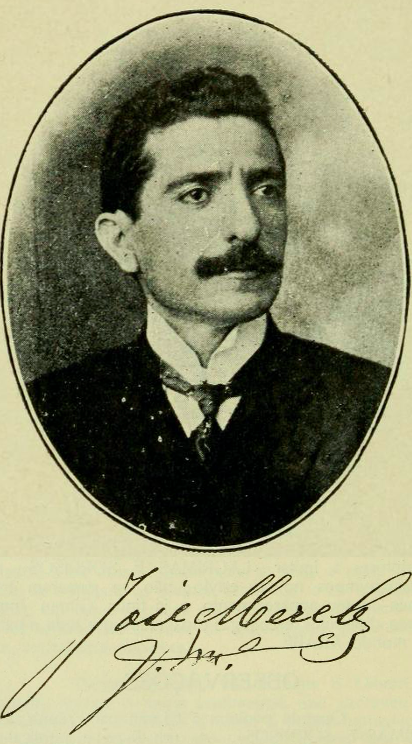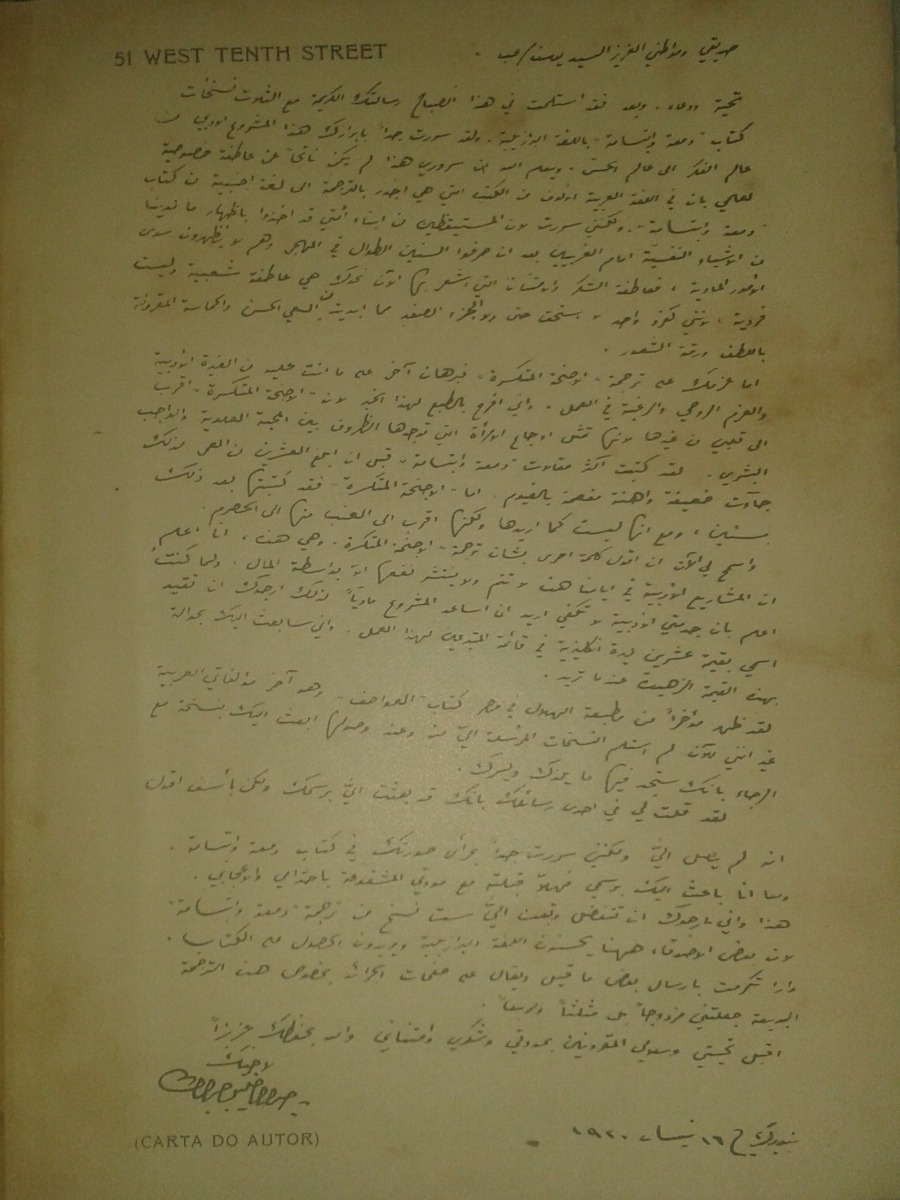By Francesco Medici
All Rights Reserved © Copyright Francesco Medici 2024

José Mereb (Yūsuf Mir‘ib) was a Lebanese writer who immigrated to Brazil and undertook the task of translating the works of Kahlil Gibran into Portuguese. Born around 1875, Mereb hails from the same hometown as Gibran, Bcharré (Bišarrī). He embarked on his journey to America as a teenager and eventually settled in Pelotas, a city nestled in the southern state of Rio Grande do Sul.
In 1920, he published his translation from the original Arabic of Dam‘ah wa Ibtisāmah (A Tear and a Smile) [1] with the title Lagrimas e sorrisos.[2] In her journal dated April 17, 1920, Gibran’s friend and patroness, Mary Elizabeth Haskell (1873–1964), recorded his words about the translator:
“The Brazilian edition of Tears and Smile […] with the pug-nose cut of Kahlil in front and a photograph of the translator. «He’s from my own town – but brought up in Brazil – and he learned Arabic in order to read my work. I know him well from my letters. I’m told the translation is in the most beautiful Brazilian.»”[3]
Mereb translated from the Arabic also al-Aǧniḥah al-Mutakassirah (The Broken Wings)[4] and al-Arwāḥ al-Mutamarridah
(Spirits Rebellious),[5] respectively with the titles As asas mutiladas[6] and Os espiritos insurgents[7], and from the English The Prophet, with the title O profeta[8] and Spiritual Sayings,[9] with the title Mensagens espirituais.[10] In 1929 he translated and edited a collection of excerpts from various Arab writers under the title Anthologia arabe (Arab Anthology).[11]
Despite the richness of his contributions, much of Mereb's correspondence with Gibran seems to have been lost to time, save for a single letter of gratitude from Gibran himself. Dated shortly after the publication of "Lágrimas e Sorrisos," Gibran's letter expressed profound appreciation for Mereb's efforts, acknowledging the significance of translating his works into Portuguese and bridging cultural divides. It also featured in the original Arabic, translated by Mereb himself into Portuguese, an introduction to O profeta:
51 West Tenth Street
 Dear friend and fellow countryman Mr. José Mereb, I offer you my cordial greetings.
Dear friend and fellow countryman Mr. José Mereb, I offer you my cordial greetings.
This beautiful morning, I received your kind letter, including three copies of the book A Tear and a Smile translated into Portuguese.
Great was my joy for your noble act of conveying this moral problem from the region of ideas to the world of reality.
As God is my witness, my contentment is not the effect of a particular disorder, for recognizing that in our Arabic language, thousands of literary works are more deserving than A Tear and a Smile to be translated into another language.
However, I am glad to hear that the awakened sons of my race, after spending so many years in exile, withdrawn wholly to material causes, have begun to exhibit something of our valuable intellectual treasures before the Western people.
The grateful emotion I feel for you is a collective emotion; it is not individual; as an entity, I do not deserve any element of your noble initiative, shaped by delicate and altruistic sentimentality.
As for your decision to translate the book The Broken Wings, it is yet another proof of your spiritual energy and your love of work.
Certainly, it makes my soul very happy, the comforting news of your translation of The Broken Wings as it is more attractive to my heart than other writings of mine, because it represents the painful profile of the oriental woman, who sees herself placed between Divine love and worldly duty.
I had written most of the parts of A Tear and a Smile before I turned twenty springs; they came out pale, wrapped in new ones. The Broken Wings, however, was written many years later; although it is not what I wanted, it is, more like a mature branch than a green one.
Allow me to say another word to you concerning The Broken Wings. Here it is…
I know that the moral problems of our days do not materialize and do not have their effects, if not through money, recognizing, that my moral help is not enough. I therefore want to help this noble initiative with something material; I ask you to inscribe my name with twenty pounds sterling in the list of those who signed up for this worthy act of yours; and I am ready to send you this insignificant amount whenever you want.
The book The Tempests,[12] my last work in Arabic, has just been published by «al-Hilāl»[13] Printing Department in Egypt. But I still have not received the copies they were supposed to send me. As soon as they arrive, I will send you one, hoping you will find something in it that will please and satisfy you.
You told me in one of your previous letters that you had sent me your portrait; however, with great regret, I tell you that I did not receive it: nevertheless, I was happy to see it lithographed in the work A Tear and a Smile. In return, I also offer you mine and ask you to accept it as a proof of my esteem and admiration for you.
If possible, I beg you to gift me with six more copies of A Tear and a Smile, as some friends who know Portuguese here are eager to acquire the work; and, if possible, if you could also send me what is said in the press about the beautiful translation, I would be thrice grateful to you.
Please accept my cordial greetings, filled with esteemed gratitude. And may God keep you for your brother,
Kahlil Gibran
New York, May 16, 1920[14]
* This article is based on an excerpt from the paper: F. Medici, Muhāǧirūn wa Mutarǧimūn: Early Arab Authors of the Diaspora as Translators and Self-Translators, «Letters from Byblos», No. 28, Byblos: 2024, pp. 13-57.
[1] Ǧubrān Ḫalīl Ǧubrān, Kitāb Dam‘ah wa Ibtisāmah, Maṭba‘at al-Atlantīk, New York 1914 (cf. Kahlil Gibran, Tears and Laughter, Translated from the Arabic by Anthony Rizcallah Ferris, Edited by Martin L. Wolf, New York: The Philosophical Library, 1947; Kahlil Gibran, A Tear and a Smile, Translated from the Arabic by H.M. Nahmad, New York: Knopf, 1950).
[2] Gibran K. Gibran, Lagrimas e sorrisos, Traduzido do Syrio para o vernaculo por José Mereb, Pelotas-Janeiro: Typographia Guarany, 1920.
[3] Beloved Prophet: The Love Letters of Kahlil Gibran and Mary Haskell and Her Private Journal, Edited and Arranged by Virginia Hilu, London: Quartet Books, 1973, p. 325.
[4] Ǧubrān Ḫalīl Ǧubrān, al-Aǧniḥah al-Mutakassirah, Maṭbaʻat Ǧarīdat Mir’āt al-Ġarb, New York 1912.
[5] Ǧubrān Ḫalīl Ǧubrān, al-Arwāḥ al-Mutamarridah, Maṭbaʻat Ǧarīdat al-Muhāǧir, New York 1908 (cf. Kahlil Gibran, Spirits Rebellious, Translated from the Arabic and with an Introduction by H.M. Nahmad, New York: Knopf, 1948).
[6] Gibran K. Gibran, As asas mutiladas, versão de José Mereb, Pelotas: Typographia do Diario Popular, 1921.
[7] Gibran K. Gibran, Os espiritos insurgents, traduzido directamente do Arabe para o vernaculo por José Mereb, 1926 (publisher and place of publication unknown).
[8] Gibran K. Gibran, O profeta, versão de José Mereb, Porto Alegre: Livraria do Globo, 192- (precise year of publication not identified).
[9] Spiritual Sayings of Kahlil Gibran, Translated from the Arabic and edited by Anthony Rizcallah Ferris, New York: The Citadel Press, 1962.
[10] Gibran K. Gibran, Mensagens espirituais, 196- (publisher, place and year of publication not identified).
[11] Anthologia arabe, Pelotas: Livraria do Globo, 1929. Among his other works there are Lendas do Oriente (Legends of the East) and Affifa (‘Afīfah), whose publisher, place and year of publication are not identified.
[12] Ǧubrān Ḫalīl Ǧubrān, al-‘Awāṣif, al-Qāhirah: Maṭbaʻat al-Hilāl, 1920.
[13] «al-Hilāl» (‘The Crescent’), among the oldest magazines dealing with arts in the Arab world, is a monthly Egyptian cultural and literature magazine founded in 1892 in Cairo by Ǧurǧī Zaydān (1861-1914).
[14] Cf. O profeta, pp. 7-9 (translated into English by Glen Kalem and Francesco Medici).